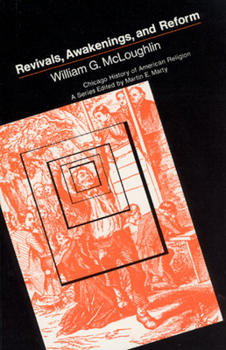Revivals, Awakening and Reform
Select Format
Select Condition 
Book Overview
In Revivals, Awakenings, and Reform , McLoughlin draws on psychohistory, sociology, and anthropology to examine the relationship between America's five great religious awakenings and their influence... This description may be from another edition of this product.
Format:Paperback
Language:English
ISBN:0226560929
ISBN13:9780226560922
Release Date:August 1980
Publisher:University of Chicago Press
Length:256 Pages
Weight:0.50 lbs.
Dimensions:0.6" x 5.2" x 8.0"
Customer Reviews
2 ratings
A Provocative Interpretation Worth Consideration
Published by Thriftbooks.com User , 15 years ago
William McLoughlin was one of the most important scholars of American religious history during his long academic career. A Christian, he produced many seminal works on church and state relations, American evangelicalism, and 19th century missions. In this essay, which he wrote in the midst of the cultural turmoil of the early 1970s, he attempted to interpret the history of American culture through the lens of Anthropologist Anthony F. C. Wallace's work on Revitalization Movements. At the risk of greatly over-simplifying a complex argument, Wallace suggested that cultures periodically experience periods of crisis when social, economic, and political arrangements no longer conform to deeply held cultural norms. When efforts to fix society through established means fail to achieve success, people frequently turn to charismatic movements that provide them with a new worldview that integrates the traditional symbols of the culture with the new social realities. These "revitalization movements" are the means by which cultural traditions are preserved through all the changes of historical development. McLoughlin asked whether or not the history of the United States fit Wallace's model, and hypothesized that periodic mass religous movements (Awakenings)in America, from the colonial era up to the 1970s, have indeed functioned as revitalization movements. In his introduction he admits that his essay is theoretical and especially in the final chapter highly speculative rather than a work of empirical history. Far from being "biased" toward social reform, as one reviewer has stated, McLoughlin's whole point was that Awakenings are broader than revivals, and that religious awakenings are indeed the master key for understanding the process of cultural change in America. The value of his essay is precisely in showing the links between revivals and other aspects of culture. The reviewer who suggested that this is not the book to buy if you want a straightforward history of revivalists, or a theological treatise on the Holy Spirit in America, is absolutely correct. But then, McLoughlin was not attempting to write such a study. And as a Christian, I suspect that he would have pointed out that the Holy Spirit is not subject to empirical proof and cannot be cited in footnotes. But there is nothing in his argument that would preclude Christians from believing that awakenings are works of the Holy Spirit as well as revitalization movements. McLoughlin's schema is open to criticism at many points, but it succeeds in raising many provocative questions and does indeed provide a wealth of information about the history of American religion. Any serious student of American religious culture will find it worth reading.
Lots of good information, misprojection at end.
Published by Thriftbooks.com User , 19 years ago
I ordered this because I wanted to know more about the dynamics of earlier revival moments - the First and Second Great Awakenings, and the Social Gospel movement of the early 20th century. I definitely got that, as McLoughlin traced how these bursts of faith reflected changes in the underlying society. A bonus was McLoughlin's discussion of how slavery affected religious perspectives in the American South. McLoughlin's bias throughout the book seems pretty clearly toward social reform rather than "inward and personal holiness". As the book continues, it becomes clearer and clearer that he prefers reformers who want to apply Christ's teachings more broadly. At the end of the book, after an interesting look at how beatniks and hippies fit into American religious patterns, this leads him into a serious misprojection of where the "Fourth Great Awakening" he sees starting after World War II will lead the country. He forecasts change further away from the fundamentalist perspective, and political change to match, but the world seems to have gone the opposite way.





